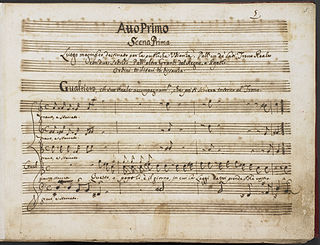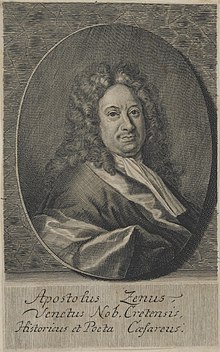
Pietro Antonio Domenico Trapassi, better known by his pseudonym of Pietro Metastasio, was an Italian poet and librettist, considered the most important writer of opera seria libretti.

Johann Adolph Hasse was an 18th-century German composer, singer and teacher of music. Immensely popular in his time, Hasse was best known for his prolific operatic output, though he also composed a considerable quantity of sacred music. Married to soprano Faustina Bordoni and a friend of librettist Pietro Metastasio, whose libretti he frequently set, Hasse was a pivotal figure in the development of opera seria and 18th-century music.

Opera seria is an Italian musical term which refers to the noble and "serious" style of Italian opera that predominated in Europe from the 1710s to about 1770. The term itself was rarely used at the time and only attained common usage once opera seria was becoming unfashionable and beginning to be viewed as something of a historical genre. The popular rival to opera seria was opera buffa, the 'comic' opera that took its cue from the improvisatory commedia dell'arte.

Arianna in Creta is an opera seria in three acts by George Frideric Handel. The Italian-language libretto was adapted by Francis Colman from Pietro Pariati's Arianna e Teseo, a text previously set by Nicola Porpora in 1727 and Leonardo Leo in 1729.

Francesco Domenico Araja was an Italian composer who spent 25 years in Russia and wrote at least 14 operas for the Russian Imperial Court including Tsefal i Prokris, the first opera in Russian.

Artaserse is the name of a number of Italian operas, all based on a text by Metastasio. Artaserse is the Italian form of the name of the king Artaxerxes I of Persia.

Domènec Terradellas was a Spanish opera composer. The birthdate is sometimes incorrectly given as 1711. Carreras i Bulbena did extensive research in contemporary documents, such as baptismal records, and found that the correct date was 1713. All his works are thoroughly Italian in style.

Didon (Dido) is a tragédie lyrique in three acts by the composer Niccolò Piccinni with a French-language libretto by Jean-François Marmontel. The opera is based on the story of Dido and Aeneas from Virgil's Aeneid as well as Metastasio's libretto Didone abbandonata. Didon was first performed at Fontainebleau on 16 October 1783 in the presence of the French sovereigns, Louis XVI and Marie Antoinette. After being remounted at court twice, the opera had its Paris public premiere on 1 December 1783. It proved to be the composer's greatest success and was billed almost every year till 1826, enjoying a total of 250 performances al the Paris Opera. Didon had some influence on Berlioz's opera on the same theme, Les Troyens.

Griselda is an opera seria in three acts by the Italian composer Alessandro Scarlatti, the last of Scarlatti’s operas to survive completely today. The libretto is by Apostolo Zeno, with revisions by an anonymous author. Zeno wrote his work in 1701 and it had already been set by Pollarolo and Antonio Maria Bononcini. It is based on the story of Patient Griselda from Boccaccio's tenth day of The Decameron. Scarlatti's opera was first performed at the Teatro Capranica, Rome, in January 1721 with an all-male cast.

Temistocle (Themistocles) is an opera seria in three acts by the German composer Johann Christian Bach. The Italian text is an extensive revision of the libretto by Metastasio first set by Antonio Caldara in 1736, by Mattia Verazi, court poet and private secretary to the Elector Palatine Carl Theodor. The opera was the first of two which J. C. Bach set for the Elector Palatine. Some of the music was reused from earlier works, including part of the overture from Carattaco.

Giuseppe Maria Orlandini was an Italian baroque composer particularly known for his more than 40 operas and intermezzos. Highly regarded by music historians of his day like Francesco Saverio Quadrio, Jean-Benjamin de La Borde and Charles Burney, Orlandini, along with Vivaldi, is considered one of the major creators of the new style of opera that dominated the second decade of the 18th century.
Pietro Chiarini was an Italian composer.

Gennaro Manna was an Italian composer based in Naples. He was a member of the Neapolitan School. His compositional output includes 13 operas and more than 150 sacred works, including several oratorios.

Adriano in Siria is a libretto by Italian poet Metastasio first performed, with music by Antonio Caldara, in Vienna in 1732, and turned into an opera by at least 60 other composers during the next century. Metastasio based the background of the story on late Classical works by Cassius Dio and Elio Sparziano.

Sebastiano Biancardi, known by the pseudonym Domenico Lalli, was an Italian poet and librettist. Amongst the many libretti he produced, largely for the opera houses of Venice, were those for Vivaldi's Ottone in villa and Alessandro Scarlatti's Tigrane. A member of the Accademia degli Arcadi, he also wrote under his arcadian name "Ortanio". Lalli was born and raised in Naples as the adopted son of Fulvio Caracciolo but fled the city after being implicated in a bank fraud. After two years wandering about Italy in the company of Emanuele d'Astorga, he settled in Venice in 1710 and worked as the "house poet" of the Grimani family's theatres for the rest of his career. In addition to his stage works, Lalli published several volumes of poetry and a collection of biographies of the kings of Naples. He died in Venice at the age of 62.

La Dori, overo Lo schiavo reggio is a tragi-comic opera in a prologue and three acts composed by Antonio Cesti to a libretto by Giovanni Filippo Apolloni. It was first performed in the court theatre at Innsbruck in 1657. The story is set in Babylon on the shores of the Euphrates and is a convoluted tale of mistaken identities—a female protagonist who disguised as a man eventually regains her lost lover, and a man disguised as a woman who causes another man to fall in love with him. In several respects it resembles the plot of Cesti and Apolloni's earlier opera L'Argia and foreshadows Apostolo Zeno's libretto for Gli inganni felici (1695) and Metastasio's libretto for L'Olimpiade (1733). The first Italian staging of La Dori was in Florence in 1661 for the wedding of Cosimo III de' Medici, Grand Duke of Tuscany. It subsequently became one of the most popular operas in 17th-century Italy. The opera was revived three times in the 20th century, beginning in 1983.

Ambleto is a three act opera by Francesco Gasparini with a libretto by Apostolo Zeno and Pietro Pariati. It was first performed at Teatro San Cassiano in Venice for the carnival in 1706. It was possibly one of the earliest operas written on the subject of William Shakespeare's play Hamlet, and the first in Italian.

Alessandro nell'Indie is a libretto in three acts by Pietro Metastasio. It was set to music around ninety times firstly by Leonardo Vinci, whose version premiered in Rome on 2 January 1730. The libretto was the fourth of five that Metastasio wrote for the Teatro delle Dame in Rome between 1727 and 1730. The work was dedicated to the Stuart pretender to the British throne, James Francis Edward Stuart, then resident in Rome.

Semiramide is a dramma per musica in three acts by Antonio Vivaldi composed to a libretto by Francesco Silvani.

Polifemo is an opera in three acts by Nicola Porpora with a libretto by Paolo Rolli. The opera is based on a combination of two mythological stories involving the cyclops Polyphemus: His killing of Acis and his blinding by Ulysses.


















